Masters of leather
Leather tanning is one of the oldest trades still practised in Madrid. Today the city is home to many an artisan who works with leather using age-old techniques to create handbags, rucksacks, wallets, and more. In these workshops and studios, you will find products brimming with passion, small works of art of which no two are the same. By Silvia Roba
Tanning is a trade steeped in history, so it’s no surprise Madrid has a street named after the tanners themselves. However, contrary to popular belief, the tanning guild was not founded on Ribera de Curtidores, the street that runs through the heart of El Rastro flea market.
Up until the end of the 15th century, the guild could be found on Caños del Peral, in today’s Plaza de Isabel II, thanks to its proximity to one of the entry points of the old city walls, the Valnadú gate. In 1495, the Catholic Monarchs favoured its change of location, bringing it closer to Calle de Toledo, around which the first slaughterhouses were built.
The slaughtering of animals resulted in large quantities of pelt, which was then crafted into leather at the nearby tanneries. Today Madrid is home to an array of workshops, where artisans with great skill and many a fresh idea are breathing new life into this old profession. Let’s learn more about them!
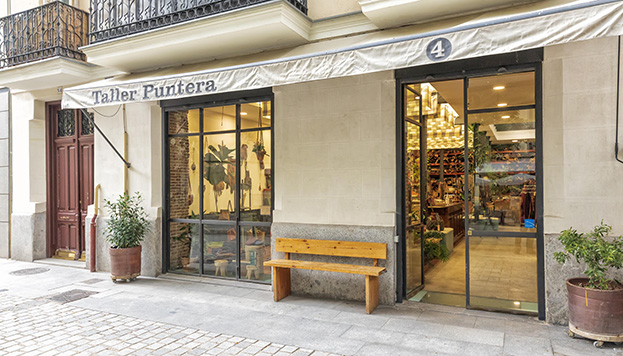
Eight tanners, a shelf overflowing with hides, a cutting table, three sowing machines, and a bunch of tools. Welcome to Taller Puntera, a space for leather artisans. Find pencil cases, notebooks, handbags, rucksacks, wallets, and magazine holders, all made in a range of colours – from orange, green, red, and more – and with bespoke or traditional designs.
To get your hands on any of these hand-made items, simply head down to this stunning studio and showroom, a stone’s throw away from the San Miguel Market. The second you step through its doors expect to be blown away by the art of leather craft. Here you can watch the manufacturing process from start to finish, ensuring a very special connection with the item before you take it home.
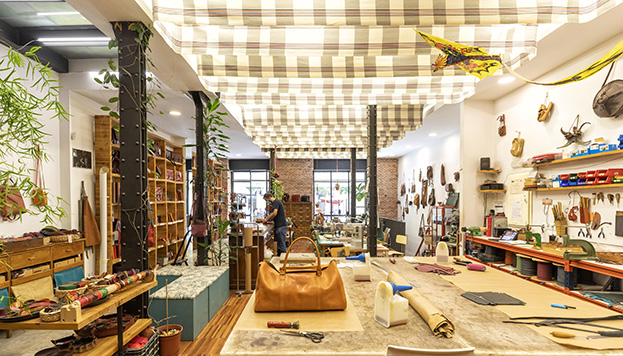
Taller Puntera opened its doors in 2009 with Luis Alonso at its helm. And it is this space he chose to follow in the footsteps of his father, Manuel, and his uncle, Valentín, who once owned a leather workshop in the Conde Duque district. It may sound like a cliché, but there’s one thing Luis doesn’t want us to forget, and that’s the top-notch quality of this studio’s mostly vegetable-tanned leather products.
He always ensures that the hides he uses have a natural finish, lending his products their own personality; each one is different from the next depending on the cut used and its appearance will change over time, forming a unique patina. He also strives to maintain these levels of quality in all the other production materials he uses, from the thread to zips and metal fittings, not forgetting accessories like notebooks and pencils.
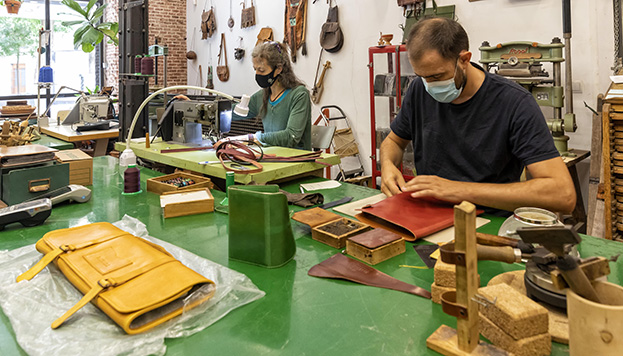
“An honest manufacturing process” is the motto of this studio. And this is achieved by respecting each material and making pieces that last, with durability being another of the hallmarks of these products. What’s more, if the items on display at Taller Puntera don’t tickle your fancy, not to worry! They also make items to order. And best of all, the studio also runs introduction courses for the most curious of customers.
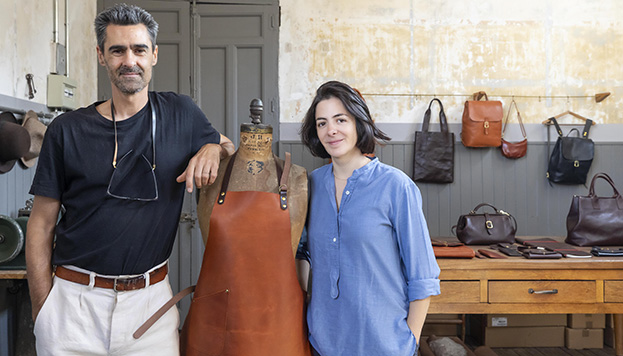
“Every piece has its own story.” Although, perhaps the most unique story of all is how the two owners of this studio met. In 2009, Melina left Mexico and moved to Spain. One day, she happened to come across David’s bike repair shop, so she went inside to ask if they could fix the chainstay protector on her Dutch bicycle. However, David was more interested in what she was carrying – a leather handbag she had made herself. In actual fact, the reason Melina had moved to Spain was in search of globally renowned vegetable-tanned artisan leather.
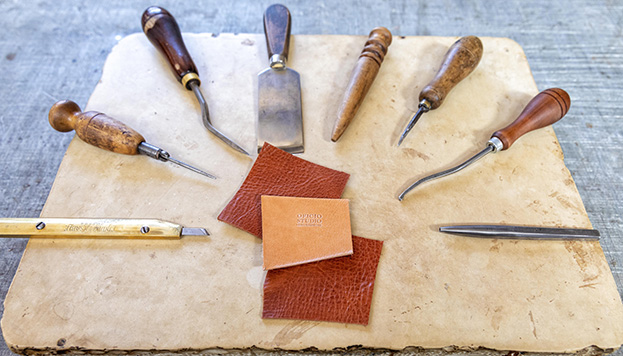
Melina was fascinated by traditional leather bags, and for this reason she decided to pursue this old European craft. She had no idea that this casual exchange with David would lead the two of them to designing their first item: the Anita Doctor Bag. Today an iconic best-seller, this bag is a compact, elegant version of 19th-century medical bags.
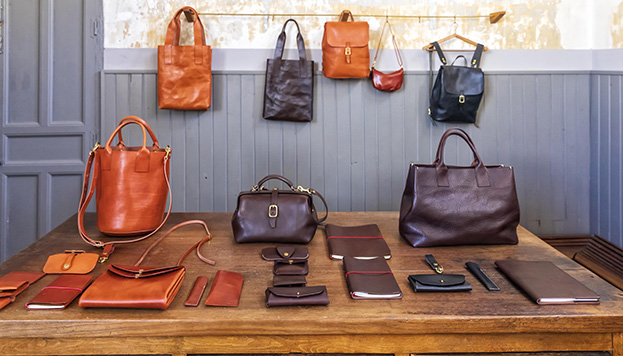
Since that moment Melina and David have been inseparable. With a view to keep alive age-old traditions, they opened this studio, where they welcome customers with appointment-only service. Here they craft truly unique hand-made leather items that are not only authentic but also functional and durable: the Ally bag is designed to hold everyday essential items; Olivia is their interpretation of the classic Bucket Bag; and the Verbena crossbody bag is both light and comfortable. They also make belts, cardholders, glasses cases, aprons, and watch straps.
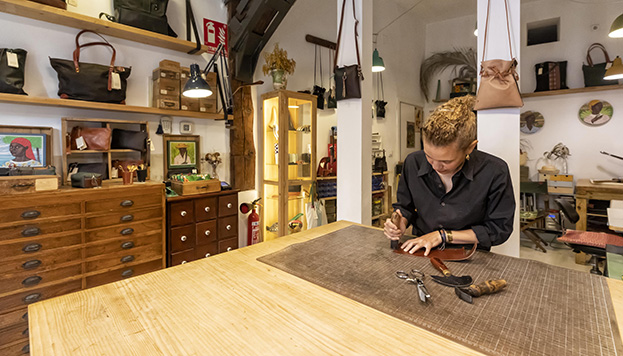
Fran and Mónika also know a thing or two about bicycles. In fact, their first idea was to make a small leather bag for bike tools. Despite coming from the world of design and photography, one day they decided to open their own workshop. In Galician, the word ollomao is the name of a specific type of seashell. Yet it is here, far from the sea at this leather studio in the district of Lavapiés, where the couple craft bags, rucksacks, briefcases, and wallets.
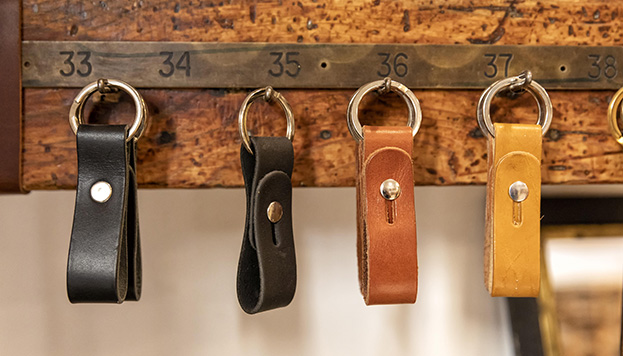
Here every step of this manufacturing process is artisan and employs timeless, traditional techniques. There is a creative practice behind each piece and great emphasis is placed on the hands that craft them with great care.
The majority of the items here are made from vegetable-tanned Spanish leather from the meat industry. “Vegetable tanning uses natural tannins from the bark of acacia, oak and chestnut trees and the flowers of the mimosa tree,” explains Mónika. What’s more, the canvas they use is made from 100% Spanish cotton from recycled deadstock materials.
